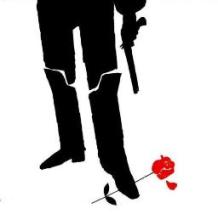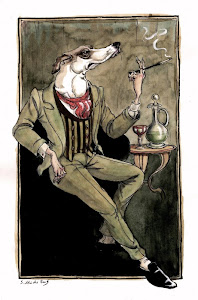 “The family of Ungern von Sternberg is an old family, a mixture of Germans with Hungarians—Huns from the time of Attila. My warlike ancestors took part in all the European struggles. They participated in the Crusades and one Ungern was killed under the walls of Jerusalem, fighting under Richard Coeur de Lion. Even the tragic Crusade of the Children was marked by the death of Ralph Ungern, eleven years old. When the boldest warriors of the country were despatched to the eastern border of the German Empire against the Slavs in the twelfth century, my ancestor Arthur was among them, Baron Halsa Ungern Sternberg. Here these border knights formed the order of Monk Knights or Teutons, which with fire and sword spread Christianity among the pagan Lithuanians, Esthonians, Latvians and Slavs. Since then the Teuton Order of Knights has always had among its members representatives of our family. When the Teuton Order perished in the Grunwald under the swords of the Polish and Lithuanian troops, two Barons Ungern von Sternberg were killed there. Our family was warlike and given to mysticism and asceticism.
“The family of Ungern von Sternberg is an old family, a mixture of Germans with Hungarians—Huns from the time of Attila. My warlike ancestors took part in all the European struggles. They participated in the Crusades and one Ungern was killed under the walls of Jerusalem, fighting under Richard Coeur de Lion. Even the tragic Crusade of the Children was marked by the death of Ralph Ungern, eleven years old. When the boldest warriors of the country were despatched to the eastern border of the German Empire against the Slavs in the twelfth century, my ancestor Arthur was among them, Baron Halsa Ungern Sternberg. Here these border knights formed the order of Monk Knights or Teutons, which with fire and sword spread Christianity among the pagan Lithuanians, Esthonians, Latvians and Slavs. Since then the Teuton Order of Knights has always had among its members representatives of our family. When the Teuton Order perished in the Grunwald under the swords of the Polish and Lithuanian troops, two Barons Ungern von Sternberg were killed there. Our family was warlike and given to mysticism and asceticism. During the sixteenth and seventeenth centuries several Barons von Ungern had their castles in the lands of Latvia and Esthonia. Many legends and tales lived after them. Heinrich Ungern von Sternberg, called ‘Ax,’ was a wandering knight. The tournaments of France, England, Spain and Italy knew his name and lance, which filled the hearts of his opponents with fear. He fell at Cadiz ‘neath the sword of a knight who cleft both his helmet and his skull. Baron Ralph Ungern was a brigand knight between Riga and Reval. Baron Peter Ungern had his castle on the island of Dago in the Baltic Sea, where as a privateer he ruled the merchantmen of his day.
In the beginning of the eighteenth century there was also a well-known Baron Wilhelm Ungern, who was referred to as the ‘brother of Satan’ because he was an alchemist. My grandfather was a privateer in the Indian Ocean, taking his tribute from the English traders whose warships could not catch him for several years. At last he was captured and handed to the Russian Consul, who transported him to Russia where he was sentenced to deportation to the Transbaikal. I am also a naval officer but the Russo-Japanese War forced me to leave my regular profession to join and fight with the Zabaikal Cossacks. I have spent all my life in war or in the study and learning of Buddhism. My grandfather brought Buddhism to us from India and my father and I accepted and professed it. In Transbaikalia I tried to form the order of Military Buddhists for an uncompromising fight against the depravity of revolution.”
Ferdinand Ossendowski, Beasts, Men, and Gods (1922)





















7 comments:
Thanks for the tip, I'll definitely read Ossendowski's book.
This man is aware of his glorious Christian heritage, and yet chose Buddhism? What a disgrace.
I never got around to reading Ossendowski, one day I will have to find a copy. I did stumble across "The Bloody White Baron" by James Palmer a few years ago. That is a quite good overview of Ungern-Sternberg, and references Ossendowski's work. The Palmer book is likely easier to find.
et voila: http://www.gutenberg.org/files/2067/2067-h/2067-h.htm JRF
http://madmonarchist.blogspot.com/2012/09/religion-and-mad-baron.html
Obviously he was a Christian.
As much as I dislike women in positions of authority, I make an exception when it comes to the Grand Duchess. She is extremely intelligent, tough minded, and fluent in several languages.
She would make a great ruler for Russia. Her son, the Grand Duke George, not so much. He is in his thirties now and still unmarried. The Imperial Family is hanging by a very slender thread.
I'm actually reading Ossendowski right now. It makes me long to be in those wild places.
Post a Comment